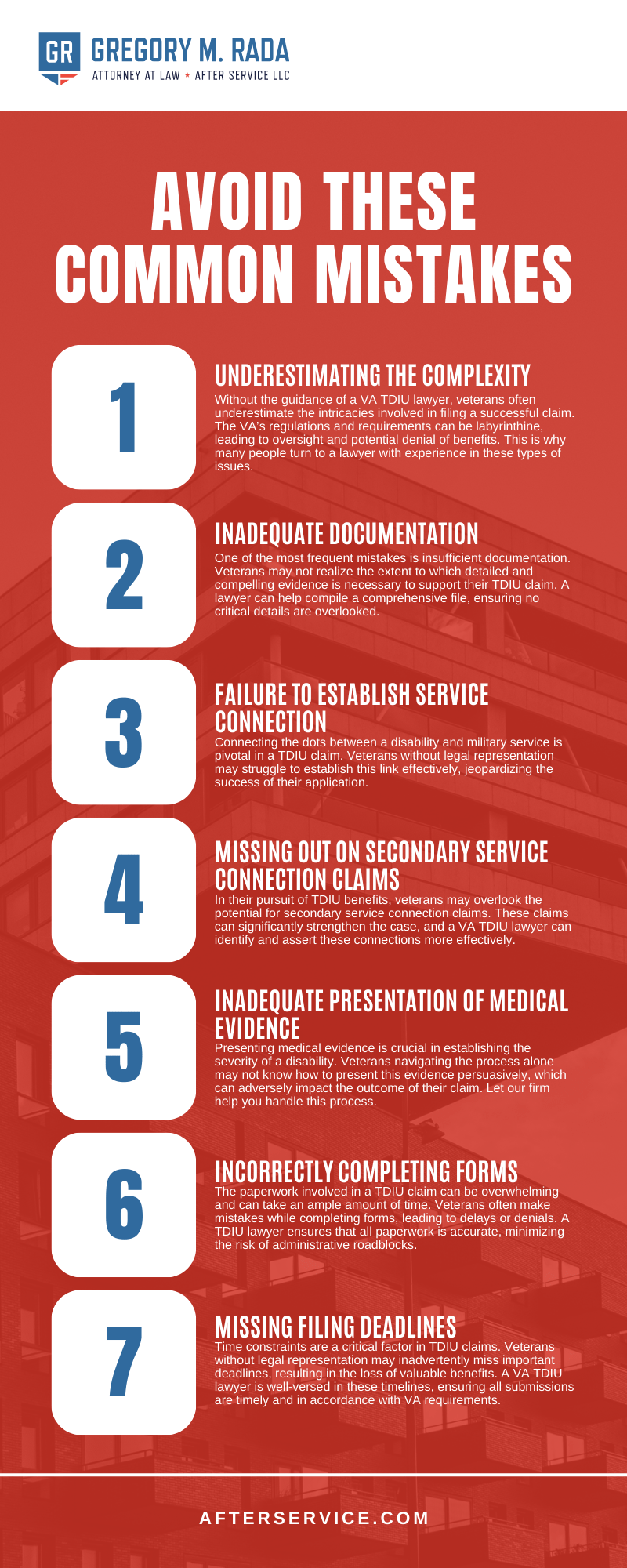TDIU Lawyer
TDIU Lawyer
VA TDIU Lawyer
A VA TDIU lawyer from Gregory M. Rada, Attorney at Law knows that as a Veteran, you may sometimes feel like you aren’t getting the support you deserve, especially after the sacrifices you have made for the greater good. You have given your emotional, physical, and mental health for your country, and are entitled to benefits for life. But unfortunately, that doesn’t always happen. In fact, sometimes the VA denies disability compensation for what seems like no reason at all. If your claim has been denied, please contact me, Gregory M. Rada, Attorney at Law as soon as you can. I am here to support you, and am not afraid to strongly advocate for you.
Table Of Contents
- Understanding Total Disability Individual Unemployability (TDIU)
- Eligibility Criteria For Total Disability Individual Unemployability (TDIU)
- How Hard Is It To Get TDIU From The VA?
- Frequently Asked Questions About VA TDIU
- Avoid These Common Mistakes: Your Guide To TDIU Claims Without A Lawyer
- TDIU Infographic
- VA TDIU Statistics
- Contact Attorney Gregory M. Roda
 TDIU is an acronym, standing for “Total Disability Individual Unemployability”. The rating was created by the United States Department of Veteran Affairs (VA), to help veterans who are not able to maintain employment because of disability. Veterans may be granted TDIU if they are not able to obtain or keep employment due to disability.
TDIU is an acronym, standing for “Total Disability Individual Unemployability”. The rating was created by the United States Department of Veteran Affairs (VA), to help veterans who are not able to maintain employment because of disability. Veterans may be granted TDIU if they are not able to obtain or keep employment due to disability.
When a veteran submits an original claim, or for an increased rating, they are assumed to be making a claim for the most benefits allowed. So what this means, is that if the veteran’s claim has evidence that suggests they may be unemployable because of a condition connected to service, then the VA must consider and add a claim for the TDIU rating. But without help from a lawyer who understands how the VA can fail to meet the needs of veterans, they may ignore vital evidence and not offer a proper rating.

Understanding Total Disability Individual Unemployability (TDIU)
TDIU is a critical component of the VA’s disability compensation system. It acknowledges that for some veterans, the severity of their service-connected disabilities is such that it significantly hampers their ability to work. TDIU compensates these veterans at the 100% disability rate, even if their combined disability rating is less than 100%.
With assistance from a TDIU lawyer, I can give you a better understanding of your eligibility. Since it’s not automatic, there are criteria you must meet and prove. For instance, you have to show that you served in the Marine Corps, Navy, Army, Space Force, Air Force, or Coast Guard. You must have been discharged through honorable conditions, and your service must have entailed “active duty”.
Once you have an appointment scheduled with me, there are certain items to have handy. First, be sure to know what your service connected disabilities are and their ratings individually. It helps to also know your overall combined rating. Then, bring a list of your employment history from the past few years, such as the type of work, employers, earnings, and how your disability and service are related. Please let me know when the last time it was that you submitted a claim, and what the result of that was, or if this is your first time filing.
Veterans should be respected, but there are many ways that others fail to do this. Whether it is the general public that you come into contact with everyday, or the United States Department of Veterans Affairs (VA), veterans deserve to be seen and supported in every way possible, particularly when their health has been directly adversely affected from their service. I understand this, and am proud to offer help to veterans in any way I can. For more information, please reach out to me, Gregory M. Rada, Attorney at Law, a TDIU lawyer you can depend on.
Eligibility Criteria for Total Disability Individual Unemployability (TDIU)
To qualify for Total Disability Individual Unemployability (TDIU), veterans must meet certain stringent criteria set by the Department of Veterans Affairs. These criteria are essential to understand as they form the basis for determining a veteran’s eligibility for the program.
Service-Connected Disability Rating
The foundational requirement for TDIU eligibility revolves around the service-connected disability rating. This rating is a percentage assigned by the VA that reflects the severity of a veteran’s disability and its impact on their ability to work.
- Single Disability: For veterans with a single disability, this rating must be at least 60%. This high percentage indicates a severe impairment, signifying that the disability is considerably debilitating and likely impacts the veteran’s ability to engage in work activities.
- Multiple Disabilities: In cases where veterans have multiple disabilities, the combined rating must be at least 70%. Within this combined rating, at least one of the disabilities should be rated at 40% or more. The combined rating is calculated using a specific VA formula, which takes into account the cumulative impact of multiple disabilities on the individual’s overall health and functioning.
Impact on Employment
Another critical component of TDIU eligibility is the impact of these disabilities on the veteran’s employment capabilities. It’s not sufficient to merely have a high disability rating; there must be clear and convincing evidence that the disabilities directly affect the veteran’s ability to secure and maintain substantially gainful employment. This term is specifically used by the VA to denote employment that provides income above the poverty threshold and is not marginal in nature.
- Substantially Gainful Employment: To be eligible for TDIU, veterans must be unable to engage in substantially gainful employment due to their service-connected disabilities. This doesn’t necessarily mean the veteran can’t work at all. For instance, if a veteran can only engage in marginal or protected employment (like a family business or sheltered workshop), they may still qualify for TDIU.
- Evidence of Employment Impediment: Veterans must provide evidence demonstrating how their service-connected disabilities impede their ability to work. This can include medical records, statements from healthcare providers, and employment history showing a decline in work capabilities coinciding with the worsening of the disabilities.
Marginal Employment and Protected Work Environment
In certain cases, veterans may be employed but still qualify for TDIU. This is possible under the concepts of marginal employment and protected work environments.
- Marginal Employment: If a veteran’s earnings from employment are below the established poverty threshold, this is considered marginal employment. Even if working, these veterans may still be eligible for TDIU as their income does not reach the substantially gainful level.
- Protected Work Environment: This refers to a situation where a veteran is working in a specially adapted environment that accommodates their disabilities. If it weren’t for these accommodations, the veteran might not be able to sustain employment. Even if earning above the poverty level, they may still be considered for TDIU.
Understanding the eligibility criteria for TDIU is crucial for veterans seeking to benefit from this program. It requires a comprehensive assessment of not only the severity of the service-connected disabilities as reflected in the VA rating but also a clear demonstration of how these disabilities impede gainful employment. This nuanced approach ensures that TDIU benefits are accorded to those veterans whose service-related impairments significantly impact their ability to lead a financially stable and independent life through regular employment.
How hard is it to get TDIU from the VA?
Obtaining Total Disability Individual Unemployability (TDIU) from the Department of Veterans Affairs (VA) can be a challenging process for many veterans. This article aims to shed light on the complexities involved in securing TDIU benefits and the role a VA TDIU lawyer, particularly one from Gregory M. Rada, Attorney at Law, can play in this process.
TDIU is a VA benefit that provides compensation at the 100% disability rate to veterans who are unable to maintain gainful employment due to their service-connected disabilities. While the concept is straightforward, the application and approval process can be quite complex.
Obtaining Total Disability Individual Unemployability (TDIU) from the Department of Veterans Affairs (VA) can be a challenging process for many veterans. This article aims to shed light on the complexities involved in securing TDIU benefits and the role a VA TDIU lawyer, particularly one from Gregory M. Rada, Attorney at Law, can play in this process.
Understanding the Challenge of Securing TDIU
TDIU is a VA benefit that provides compensation at the 100% disability rate to veterans who are unable to maintain gainful employment due to their service-connected disabilities. While the concept is straightforward, the application and approval process can be quite complex.
Complexities in the TDIU Process
- Navigating the VA System: The VA’s system for processing disability claims, including TDIU, is notoriously complex and bureaucratic. Understanding the specific requirements, paperwork, and evidentiary standards can be daunting for many veterans.
- Gathering Sufficient Evidence: A successful TDIU claim requires substantial evidence demonstrating how a veteran’s service-connected disabilities prevent gainful employment. This often involves detailed medical records, employment history, and sometimes, expert opinions.
- High Standard of Proof: The burden of proof for TDIU is high. Veterans must clearly establish not only the severity of their disabilities but also the direct impact of these disabilities on their ability to work.
- Lengthy Processing Times: VA claims, in general, are known for their lengthy processing times. This waiting period can be stressful and frustrating for veterans who are in dire need of these benefits.
- Navigating the VA System: The VA’s system for processing disability claims, including TDIU, is notoriously complex and bureaucratic. Understanding the specific requirements, paperwork, and evidentiary standards can be daunting for many veterans.
- Gathering Sufficient Evidence: A successful TDIU claim requires substantial evidence demonstrating how a veteran’s service-connected disabilities prevent gainful employment. This often involves detailed medical records, employment history, and sometimes, expert opinions.
- High Standard of Proof: The burden of proof for TDIU is high. Veterans must clearly establish not only the severity of their disabilities but also the direct impact of these disabilities on their ability to work.
- Lengthy Processing Times: VA claims, in general, are known for their lengthy processing times. This waiting period can be stressful and frustrating for veterans who are in dire need of these benefits.
Securing TDIU benefits from the VA can indeed be a challenging endeavor. However, with the right approach, informed guidance, and professional legal assistance from a VA TDIU lawyer like those at Gregory M. Rada, Attorney at Law, veterans can navigate this complex process more effectively. We are here to help veterans through each step, ensuring that they have the best possible chance of obtaining the benefits that are crucial for their well-being and financial stability.
Frequently Asked Questions about VA TDIU
What is the difference between TDIU and a 100% disability rating?
TDIU (Total Disability Individual Unemployability) and a 100% disability rating are both VA benefits that provide similar levels of compensation. However, they are awarded under different circumstances. A 100% disability rating is given when a veteran’s service-connected disabilities are evaluated at the total level based on VA’s rating schedule. In contrast, TDIU is granted when a veteran has a lower combined disability rating (typically at least 60% or 70% for multiple disabilities), but these disabilities prevent them from maintaining substantial gainful employment.
Can I work while receiving TDIU benefits?
While receiving TDIU benefits, veterans are generally expected not to engage in substantial gainful employment due to their service-connected disabilities. However, they may still work in a limited capacity, such as in marginal or sheltered employment, where the income does not exceed the poverty threshold or where the work environment is specifically modified to accommodate their disabilities.
How long does it take to get a decision on a TDIU claim?
The time frame for a decision on a TDIU claim can vary significantly based on several factors, including the complexity of the case, the completeness of the application, and the workload of the VA office handling the claim. Generally, it can take several months to over a year. Applicants are encouraged to provide thorough and complete information to minimize delays.
Is TDIU a permanent benefit or can it be revoked?
TDIU benefits can be either permanent or temporary, depending on the nature and expected duration of the veteran’s disabilities. The VA may periodically reevaluate the veteran’s medical condition and employment status. If there is significant improvement in the veteran’s condition or they return to substantial gainful employment, the VA may reduce or terminate the TDIU benefits.
Can I apply for TDIU if I am already receiving Social Security Disability Insurance (SSDI)?
Yes, veterans can apply for TDIU benefits even if they are already receiving Social Security Disability Insurance (SSDI). The criteria for TDIU and SSDI are different, and receiving SSDI does not automatically qualify a veteran for TDIU. However, the evidence and documentation used for an SSDI claim can often be useful in supporting a TDIU claim.
Avoid These Common Mistakes: Your Guide To TDIU Claims Without A Lawyer
Navigating the intricate landscape of VA TDIU claims can be a challenging endeavor for veterans. Many face hurdles that could have been avoided with the assistance of a seasoned professional. At Gregory M. Rada, Attorney at Law, we’ve witnessed the common missteps veterans make when attempting to handle TDIU claims on their own. Here’s a comprehensive list to ensure you’re informed and equipped to sidestep these pitfalls.
1. Underestimating The Complexity
Without the guidance of a VA TDIU lawyer, veterans often underestimate the intricacies involved in filing a successful claim. The VA’s regulations and requirements can be labyrinthine, leading to oversight and potential denial of benefits. This is why many people turn to a lawyer with experience in these types of issues.
2. Inadequate Documentation
One of the most frequent mistakes is insufficient documentation. Veterans may not realize the extent to which detailed and compelling evidence is necessary to support their TDIU claim. A lawyer can help compile a comprehensive file, ensuring no critical details are overlooked.
3. Failure To Establish Service Connection
Connecting the dots between a disability and military service is pivotal in a TDIU claim. Veterans without legal representation may struggle to establish this link effectively, jeopardizing the success of their application.
4. Missing Out On Secondary Service Connection Claims
In their pursuit of TDIU benefits, veterans may overlook the potential for secondary service connection claims. These claims can significantly strengthen the case, and a VA TDIU lawyer can identify and assert these connections more effectively.
5. Inadequate Presentation Of Medical Evidence
Presenting medical evidence is crucial in establishing the severity of a disability. Veterans navigating the process alone may not know how to present this evidence persuasively, which can adversely impact the outcome of their claim. Let our firm help you handle this process.
6. Incorrectly Completing Forms
The paperwork involved in a TDIU claim can be overwhelming and can take an ample amount of time. Veterans often make mistakes while completing forms, leading to delays or denials. A TDIU lawyer ensures that all paperwork is accurate, minimizing the risk of administrative roadblocks. Our firm has years of experience in helping veterans fill out the correct forms and meet their crucial deadlines.
7. Missing Filing Deadlines
Time constraints are a critical factor in TDIU claims. Veterans without legal representation may inadvertently miss important deadlines, resulting in the loss of valuable benefits. A VA TDIU lawyer is well-versed in these timelines, ensuring all submissions are timely and in accordance with VA requirements.
TDIU Infographic

Partner With Us Today
Partnering with Gregory M. Rada, Attorney at Law, can help veterans avoid these common pitfalls. With our knowledge, we ensure your TDIU claim is meticulously prepared, increasing the likelihood of a favorable outcome. Don’t navigate the VA TDIU process alone—let us guide you towards the benefits you’ve earned. Schedule your consultation with Greg today by calling 1-800-955-8596 and take the first step towards securing the TDIU benefits you deserve.
VA TDIU Statistics
According to the Bureau of Labor Statistics, the unemployment rate for veterans who served on active duty in the U.S. Armed Forces at any time since September 2001 – a group referred to as Gulf War-era II veterans – was little changed at 3.3 percent. As of August 2023, 46 percent of Gulf War-era II veterans had a service-connected disability, compared with 30 percent of all veterans.

VA TDIU FAQs
Our VA TDIU lawyer has helped countless veterans understand their rights and successfully pursue the full disability benefits they deserve. Attorney Greg Rada, is an Air Force Veteran who has dedicated his career to helping those who have served get the compensation they’ve earned. He answers to some of the most frequently asked questions about VA TDIU claims.
What Are The Eligibility Criteria For A TDIU Claim?
To qualify for Total Disability based on Individual Unemployability (TDIU), you must show that your service-connected disabilities prevent you from maintaining substantial gainful employment. The VA requires that:
- You have at least one service-connected disability rated at 60% or higher, or
- Two or more service-connected disabilities with one rated at least 40% and a combined rating of 70% or more.
However, even if you don’t meet these percentage thresholds, you may still qualify under an extraschedular TDIU review. In these cases, the VA looks beyond your ratings and focuses on how your disabilities affect your ability to work. Evidence like medical records, employer statements, and vocational expert opinions are critical in proving eligibility and maximizing disability benefits.
Can I Work Part-Time And Still Qualify For TDIU?
Yes, you can still qualify for TDIU while working part-time, but only if your employment is considered “marginal.” The VA defines marginal employment as work that earns less than the federal poverty threshold or takes place in a sheltered or protected environment, such as a family business or workplace that accommodates your disabilities beyond what’s typical.
For example, if you can only work a few hours a week due to your service-connected conditions, and your income remains below the poverty level, you may still be eligible. The key is proving that your work doesn’t reflect the ability to maintain substantial gainful employment. Documentation showing reduced hours, frequent absences, or workplace accommodations can strengthen your case significantly.
Does My Combined Disability Rating Have To Be 100% To Receive TDIU?
No, you do not need a 100% schedular disability rating to receive TDIU benefits. The entire purpose of TDIU is to provide veterans whose disabilities prevent them from working the same compensation as those rated at 100%.
If you meet the rating criteria (either 60% for one disability or 70% combined with one at 40%), and you can demonstrate that your service-connected conditions make you unemployable, the VA may award TDIU. Even veterans with ratings as low as 50% have successfully qualified under the extraschedular TDIU provision when strong evidence supported their inability to work.
TDIU can provide life-changing financial stability for veterans who can’t sustain full-time employment but don’t have a total schedular rating.
Can The VA Reduce Or Terminate My TDIU Benefits?
Yes, the VA can reduce or terminate your TDIU benefits, but only under specific conditions. If evidence shows that your service-connected disabilities have improved to the point that you can engage in substantial gainful employment, the VA may initiate a review.
In most cases, the VA must demonstrate sustained improvement before reducing benefits. Temporary or part-time employment alone typically isn’t enough to justify termination. However, if you return to full-time work and maintain it for 12 consecutive months, the VA may determine that you no longer qualify for TDIU.
If you receive a proposal to reduce or terminate your benefits, it’s critical to act quickly. Responding with updated medical documentation and our VA TDIU lawyer can protect your rating and prevent unnecessary benefit loss.
How Does The VA Determine Whether I’m Unable To Maintain “Substantial Gainful Employment”?
The VA defines substantial gainful employment as work that provides earnings above the federal poverty threshold and isn’t considered sheltered or protected. In evaluating your case, the VA looks at your ability to perform both physical and mental job functions, not just whether you can find a job.
They consider your education, job history, work skills, and medical limitations caused by service-connected disabilities. Importantly, the VA must focus only on service-connected conditions, not age or non-service-connected health issues.
Our firm helps veterans present comprehensive evidence, such as medical evaluations, vocational expert reports, and lay statements, to show that their disabilities make steady, competitive employment impossible. This evidence can make the difference between a denied claim and a successful award.
Get The Support You Deserve
If your service-connected conditions prevent you from working, you don’t have to face the VA alone. Our VA TDIU lawyer helps veterans nationwide fight for the benefits they’ve rightfully earned. At Gregory M. Rada, Attorney at Law, we’re proud to serve veterans in Florida and across the country, guiding them through every stage of the TDIU process with proven results and personal attention. Call Greg today for a free and confidential case review. Let’s work together to secure the compensation your service has earned you.

VA TDIU Glossary
For veterans seeking Total Disability Based on Individual Unemployability (TDIU), our VA TDIU lawyer can help explain the legal terminology involved. With years of legal experience, our team at Gregory M. Rada, Attorney at Law, knows that this can make a meaningful difference in the outcome of a claim. These terms often appear in VA decisions, appeal documents, and correspondence from legal professionals. Below are five commonly used legal phrases or concepts in the context of VA TDIU cases, each explained in plain language to help clarify what they mean and how they apply to a veteran’s pursuit of benefits.
Total Disability Based On Individual Unemployability (TDIU)
TDIU is a benefit available to veterans whose service-connected disabilities prevent them from maintaining gainful employment. Even if a veteran’s official combined disability rating is below 100%, they may still receive compensation at the 100% rate through TDIU. This provision recognizes that the impact of a disability on employability may not always be reflected in a standard rating percentage. For many veterans, securing TDIU can be life-changing, providing both financial stability and recognition of the challenges they face due to service-related conditions.
Substantially Gainful Employment
This phrase is central to TDIU evaluations. Substantially gainful employment is defined as work that provides income above the federal poverty level and is not in a sheltered or protected setting. It generally involves consistent, full-time employment that is not considered marginal. If a veteran is working but earns significantly below this threshold or only engages in part-time work due to their disability, the VA may determine that the employment is not substantially gainful, which can support eligibility for TDIU. According to our award-winning VA TDIU lawyer, this assessment considers both income and the nature of the work environment.
Schedular TDIU
Schedular TDIU refers to eligibility based on the veteran’s current disability ratings. To qualify, the veteran must have either one service-connected disability rated at 60% or more or two or more disabilities with a combined rating of 70% or more, with one of those rated at least 40%. Meeting these percentages allows the VA to consider the veteran’s unemployability under the “schedular” provisions without needing special approval. It’s important to note that meeting the percentage thresholds does not automatically result in TDIU—evidence must also show that the disabilities prevent substantially gainful work.
Extraschedular TDIU
Extraschedular TDIU is available to veterans who do not meet the standard percentage requirements but are still unable to work due to service-connected disabilities. In these cases, the VA may refer the claim to the Director of Compensation Service for a special determination. This type of claim often involves more complex evidence, such as medical records, vocational assessments, and statements from former employers. Veterans who qualify under this route typically need strong legal advocacy from our VA TDIU lawyer to present a compelling case since the VA has discretion to grant or deny the benefit based on the total picture.
Protected Work Environment
This term describes a job setting where accommodations are made that would not typically be offered in a competitive work environment. Examples include working for a friend or family member, having lenient supervision, or being allowed to work at an unusually slow pace or take extended breaks. While a veteran may technically be employed in such a setting, it may not count as substantially gainful employment in the eyes of the VA. When assessing TDIU eligibility, the existence of a protected work environment can be critical evidence that the veteran is unable to compete in the general labor market due to their service-connected conditions.
Contact Attorney Gregory M. Roda
VA Total Disability Individual Unemployability (TDIU) stands as a pivotal benefit for veterans whose service-connected disabilities impede their ability to maintain gainful employment. TDIU provides these veterans with the financial support at a level commensurate with a 100% disability rating, acknowledging the profound impact their service has had on their post-military careers. The process to obtain these benefits, while intricate and demanding, is a critical pathway to ensuring that veterans receive the compensation they rightly deserve. It’s a recognition of their sacrifice and a means to support their continued well-being.
I understand the complexities and challenges that come with navigating the VA system and securing TDIU benefits. Our commitment lies in offering dedicated, expert legal assistance to guide veterans through this process. From gathering the necessary evidence to articulating the impact of disabilities on employment, our approach is tailored to address the unique circumstances of each veteran we represent. We strive to ensure that the veterans, who have given so much in service to their country, receive the support and recognition they deserve through successful TDIU claims.
Gregory M. Rada, Attorney at Law, VA TDIU Lawyer
Office
1580 N Logan St, Ste 660, PMB 4545
Denver, CO 80203
Representing Veterans Nationwide







